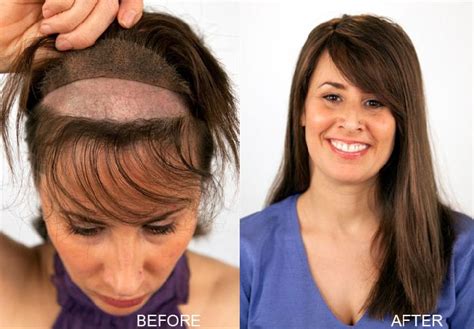Hair loss is a common concern among women, affecting millions worldwide. Whether due to hormonal changes, medical conditions, or genetics, it can take a toll on self-esteem and quality of life. Fortunately, there are numerous hair replacement options available to help women regain their confidence and enhance their appearance.

1. Wigs
Wigs offer a versatile and immediate solution for hair loss. They are made from various materials, including synthetic fibers, human hair, or a combination of both. Synthetic wigs are generally more affordable and easier to care for, while human hair wigs provide a more natural look and feel.
Types of Wigs
- Lace Front Wigs: These wigs feature a lace base along the hairline, creating a realistic and seamless look.
- Monofilament Wigs: Made from a thin, breathable material, these wigs allow for optimal airflow and scalp comfort.
- Full Cap Wigs: These wigs cover the entire head, providing complete hair coverage.
Benefits of Wigs
- Instant hair transformation
- Wide variety of styles and colors
- Convenient and easy to remove
- Can be customized to match natural hair
Drawbacks of Wigs
- Can be expensive, especially for high-quality human hair wigs
- May require maintenance and styling
- Can feel uncomfortable or itchy on the scalp
2. Hair Extensions
Hair extensions are a non-surgical method to add length, volume, or both to existing hair. They are made from either natural or synthetic hair and can be applied using various techniques, including clip-ins, fusion, or tape-ins.
Types of Hair Extensions
- Clip-In Extensions: These extensions are the easiest to apply and remove. They simply clip onto existing hair and can be used for temporary hair enhancements.
- Fusion Extensions: This method involves bonding hair extensions to natural hair using a heated tool. Fusion extensions are semi-permanent and can last for several months.
- Tape-In Extensions: Tape-in extensions are applied using adhesive tape, making them relatively easy to install and remove.
Benefits of Hair Extensions
- Can be customized to match natural hair color and texture
- Add instant length and volume
- Temporary or semi-permanent options available
- Can be used to create various hairstyles
Drawbacks of Hair Extensions
- Can be expensive for high-quality hair extensions
- May require professional installation and maintenance
- Can damage natural hair if not applied or removed properly
3. Hair Transplants
A hair transplant is a surgical procedure that involves transferring hair follicles from a donor area on the scalp to a balding or thinning area. The hair follicles grow naturally, providing permanent hair growth.
Types of Hair Transplants
- Follicular Unit Transplantation (FUT): This technique involves removing a strip of scalp from the donor area and dividing it into individual follicular units, which are then transplanted to the balding area.
- Follicular Unit Extraction (FUE): This method involves extracting individual hair follicles from the donor area using a micro-punch. The follicles are then transplanted to the balding area.
Benefits of Hair Transplants
- Permanent hair growth solution
- Natural-looking results
- Can restore hair to balding or thinning areas
Drawbacks of Hair Transplants
- Surgical procedure with potential risks
- Can be expensive and time-consuming
- Donor area may require maintenance to prevent thinning
Which Solution is Right for You?
The best hair replacement solution for you depends on your individual preferences, lifestyle, and budget. Consider the following questions:
- What is the extent of your hair loss?
- How much time and money are you willing to invest in hair replacement?
- Are you comfortable with surgical procedures?
- What are your desired results?
Table 1: Comparison of Hair Replacement Options
| Feature | Wigs | Hair Extensions | Hair Transplants |
|---|---|---|---|
| Type | Non-surgical | Non-surgical | Surgical |
| Installation | Immediate | Requires professional installation | Requires surgical procedure |
| Maintenance | Varies depending on wig type | Regular maintenance required | Minimal maintenance |
| Cost | Varies widely | Can be expensive | Typically the most expensive |
| Permanence | Temporary or semi-permanent | Temporary or semi-permanent | Permanent |
Table 2: Benefits and Drawbacks of Hair Replacement Options
| Hair Replacement Option | Benefits | Drawbacks |
|---|---|---|
| Wigs | Instant transformation, wide variety of styles | Expensive, can be uncomfortable |
| Hair Extensions | Add length or volume, customizable | Can be expensive, requires maintenance |
| Hair Transplants | Permanent solution, natural results | Surgical procedure, expensive |
Table 3: Estimated Costs of Hair Replacement Options
| Hair Replacement Option | Cost Range |
|---|---|
| Wigs | $100-$5,000 |
| Hair Extensions | $300-$1,500 per head |
| Hair Transplants | $4,000-$15,000 per procedure |
Table 4: Effective Strategies for Finding the Right Hair Replacement Solution
- Consult with a hair loss specialist or salon professional.
- Research different hair replacement options online.
- Read reviews and testimonials from others who have used the options you’re considering.
- Get samples or try on different wigs or hair extensions before committing to a purchase.
- Consider your lifestyle and needs before making a decision.
Conclusion
Hair loss can be a challenging experience, but it doesn’t have to impact your confidence or self-esteem. With the numerous hair replacement options available today, women can find customized solutions that meet their unique needs. From instant transformations with wigs to more permanent solutions with hair transplants, there is a hair replacement option to enhance your appearance and regain your confidence.
